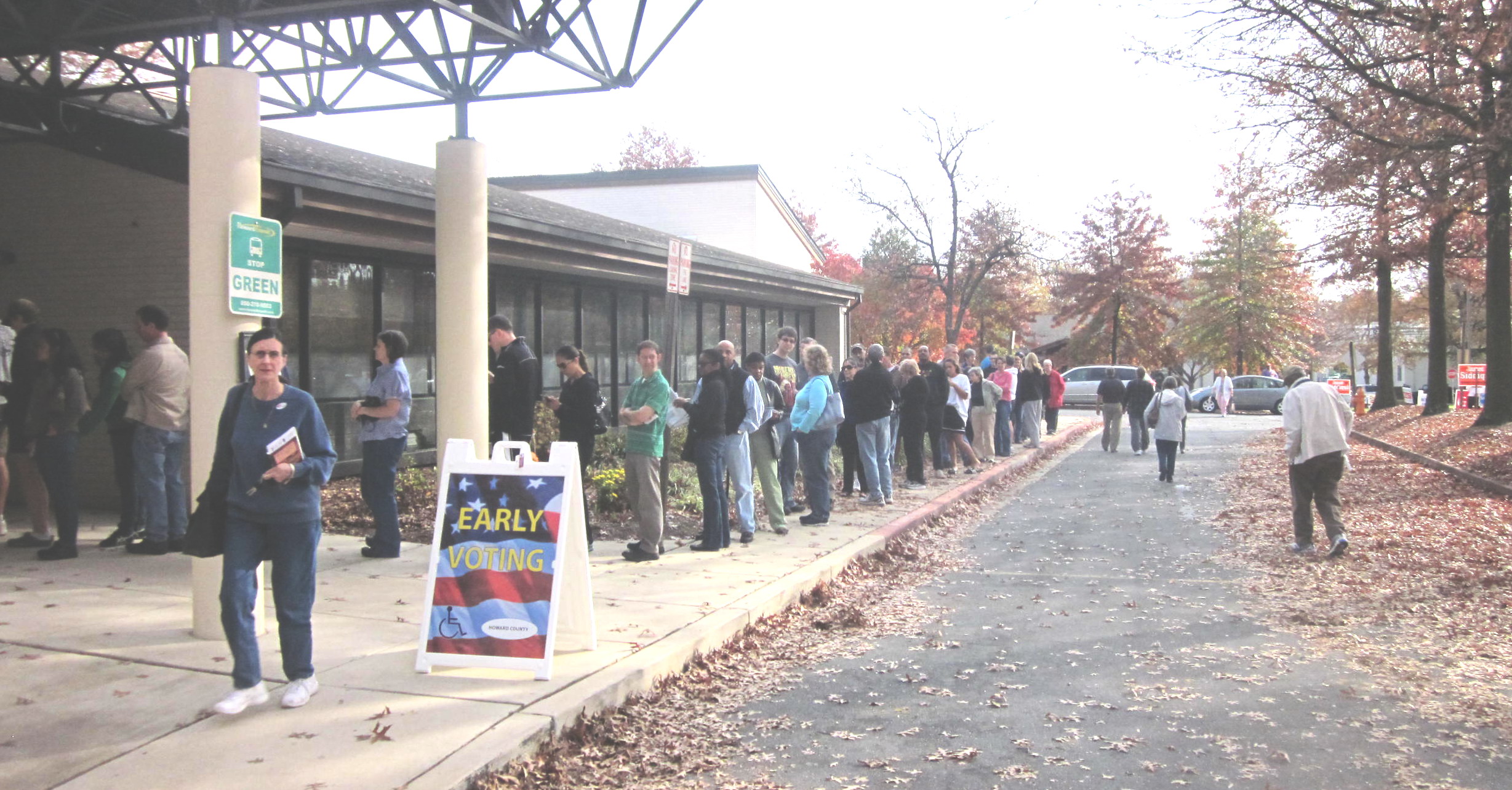
Early voting in Columbia Oct. 27. This polling place is in the middle of Del. Liz Bobo’s District 12B, which had the highest percentage of early voters of any legislative district in the state, 21%
Maryland Democrats, particularly Democratic women, clobbered Republicans in early voting turnout. It’s hard to say what impact this huge Democratic turnout might have for the final results, since no Democratic incumbents in Maryland are considered vulnerable.
Democrats made up two-thirds (66%) of the 430,000 early voters, outvoting Republicans 3.2 to 1, compared to their voter registration edge of 2 to 1, according to the State Board of Elections website. Democratic women made up 42% of early voters, while they make up a third (33%) of total registered voters. Republicans made up 20% of early voters, and independent (unaffiliated) voters made up just 11%.
In fact, the hottest contest for Congress in the 6th district, pitting 10-term Republican incumbent Roscoe Bartlett against Democrat John Delaney, had the lowest percentage of early voting turnout of any of the congressional districts, 10.6% of eligible voters, lower than the statewide average of 11.65%.
However, Montgomery County, where new Democratic voters were added to the district, had above average turnout of 12.65%, while the Republican leaning counties of Frederick, Washington, Allegany and Garrett counties, with only one polling place apiece, averaged about 8.5%. This means the more heavily Democratic areas had much higher turnout for this contest.
The heavy Democratic turnout might tend to favor the passage of the controversial ballot questions – if Democratic voters were to follow the lead of their top party officials. Gov. Martin O’Malley and the state Democratic Party have been urging voters to approve all four major ballot questions, along with the Democratic county executives in Montgomery, Prince George’s and Howard counties.
Ballot language gives an edge to supporters
The language of ballot questions 4, 5 and 6 also give an edge to supporters, as indicated by a Sunday phone call to MarylandReporter.com from an anonymous voter about congressional districting (Question 5). Reading the text, the man thought it sounded like he was approving a new plan for congressional districts, not the gerrymandered plan passed last year. He wanted to vote against that plan, which is what a vote “against” Question 5 does.
Question 4, allowing in-state college tuition for the children of illegal immigrants, also sounds relatively benign. The title is “Public Institutions of Higher Education – Tuition Rates – Exemptions” and the phrase “undocumented immigrants” is hardly strong enough for opponents, who prefer to call them “illegal aliens.” (The Associated Press Stylebook continues to favor the term “illegal immigrants,” as do many other news organizations. It is estimated that a third of “illegal immigrants” entered the United States legally, but their visas have since expired.)
Question 4 is also aided by the widespread use of the DREAM act in referring to it. What cad would destroy someone’s dream? Few people note that the federal DREAM Act, long-proposed but never passed by Congress, is an acronym for Development, Relief, and Education for Alien Minors Act.
The “Civil Marriage Protection Act” also sounds fairly neutral, but the ballot language wastes little time in saying the law allows “gay and lesbian couples to obtain a civil marriage license.”
Question 7, “Gaming Expansion” couldn’t be much more specific in its title or ballot language. With both sides throwing out so much information, some of it accurate, voters may be confused about what’s true, but that’s not due to the ballot language.
–Len Lazarick




Guess these female Dem voters are worried abt their “lady parts” & not much concerned abt the direction our state & country is heading towards. IMHO many voters will be sending a message to Annapolis & DC, like we did in 2010. Take care of the people’s business, not your cronies, or you’re outa here!